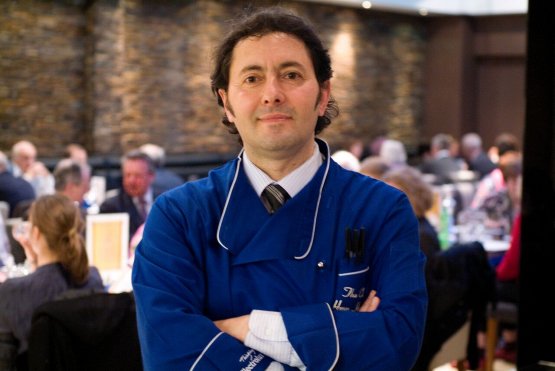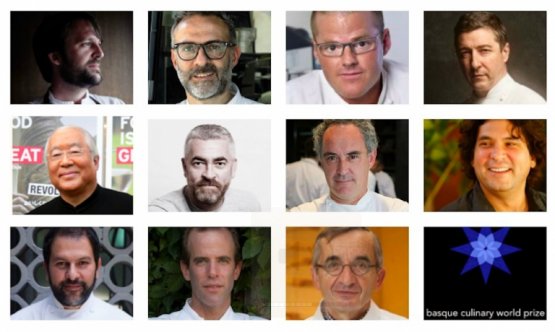«Does it make sense for chefs to take care of themes such as sustainability, local commerce or the environment? At the Basque Culinary Center we believe it does». This is what Joxe Mari Aizega, General Director of the Prize, told us a few months ago. The prize will be given on 11th July, choosing one of the twenty finalists: Alberto Crisci (UK), Alicia Gironella (Mexico), Ángel León (Spain), Ann Cooper (US), Carlos Zamora (Spain), Daniel Boulud (France/US), David Hertz(Brazil), Gabriel Garza (Mexico), Jessamyn Rodriguez (Canada/US), José Andrés (Spain/US), Joshna Maharaj (South Africa/Canada), Leonor Espinosa(Colombia), Manoela Buffara (Brazil),Margot Janse (The Netherlands), Maria Fernanda Di Giacobbe (Venezuela), Massimiliano Alajmo (Italy), Nani Moré (Spain), Rodolfo Guzmán, (Chile), Teresa Corçao (Brazil), Kamilla Seidler (Denmark) and Michelangelo Cestari (Venezuela).
The finalists were chosen based on the positive impact they had on society with their work as chefs and patrons. On top of Massimiliano Alajmo there are other “Italians abroad” shortlisted. Among them, British Alberto Crisci stands out. His parents are from Caserta and Avellino and he’s the founder of The Clink. This is the name behind four restaurants open to the public and located in as many jails in Great Britain in which convicts work. They’re also researching the idea of organising external events, in this case hiring ex-convicts who still haven’t found a stable job. The idea of the jail as a tool for social rehabilitation is indeed the basis of The Clink, as Crisci tells us.

«It all began when I was the catering manager at the High Down prison. This is where I started to teach some of the convicts to cook. I became a qualified teacher so much so my kitchen became an official catering school and we could give diplomas to the convicts who studied with me. However, I noticed that despite all this, convicts who were released then returned to jail very soon. Most of them told me that, as ex-convicts, they couldn’t find anybody willing to offer them a job».
And how did you decide to help them further?
I started by inviting the managers and owners of large catering and restaurant businesses to dine at our place. I made sure the convicts would prepare a high quality four-course menu for them, serving the dishes themselves. The result was immediately extraordinary. These entrepreneurs, who until then would have never hired them, gave them their business cards, asking them to call them once out of jail. We continued this way for around four years. Then the prison was about to be enlarged, from 700 to 1100 convicts and I had to present a project for my kitchen. Instead of asking for money to make it larger, I focused on those lunches and their development. My idea was to create a real restaurant inside the prison.
Did the jail managers accept?
Only in part. I still needed 300 thousand pounds for the restaurant to reach the standard I wanted but they gave me enough time to collect this money through private donations. Hence in 2009 the first
The Clink was born, open to the public right from the start. The goal was to give people a different perspective on prison and show them how convicts were citizens who, having a chance to work, would be able to get out of the vicious circle that continues to lead people back inside. With a very positive social effect: not only does the number of crimes decrease, but most of all, so do the huge expenses we have to support prisons.
How would you describe the culinary identity of The Clink?
Right from the start, I wanted this brand to identify with seasonal local food. We change menu every three months, so as to best portray the products you can find at the moment in Great Britain. We don’t use any products from intensive farms, we only look for sustainable products. These are all ideas I connect with my childhood experience, when I came on holiday in Italy, in Campania and I came into contact with this very sincere enthusiasm for the fresh products of the earth, even among children. Instead of sitting in front of the Playstation they took me out to pick figs when they were ripe. The same for peaches, which we only ate during those weeks when they were perfect. It’s an inspiration I still feel very strongly. On top of this, we try to offer a very complete menu, so as to allow those who work with me to learn to cook all sorts of things: there’s always pasta, fish, red meat and white meat. All the desserts are home made. Ice cream is artisanal.

The chefs in the jury of the Basque Culinary World Prize. Top left to right, René Redzepi, Massimo Bottura, Heston Blumenthal, jury president Joan Roca, Yukio Hattori, Alex Atala, Ferran Adrià, Gastón Acurio, Enrique Olvera, Dan Barber, Michel Bras. In order to decide the winner, the jury will count on the help of experts in gastronomy such as Harold McGee, Massimo Montanari, Laura Esquivel, Hilal Elver
I must say I don’t know any Italian chef in person, but I’m a careful and passionate observer of all that’s happening in Italy. I was born in Great Britain, but I feel very Italian, deep inside. I do know Italian chefs who are here in London, such as
Antonio Carluccio, or
Giorgio Locatelli, who’s a great supporter of our work.
What has it meant for you to be shortlisted in the Basque Culinary World Prize?
It was a surprise, first of all. I’m very honoured and proud to be the only one among the twenty finalists to come from the UK and the more days go by, the more I realise this is a great opportunity for me. Regardless of who will win. Should I win the prize, for me it will also be an Italian victory.